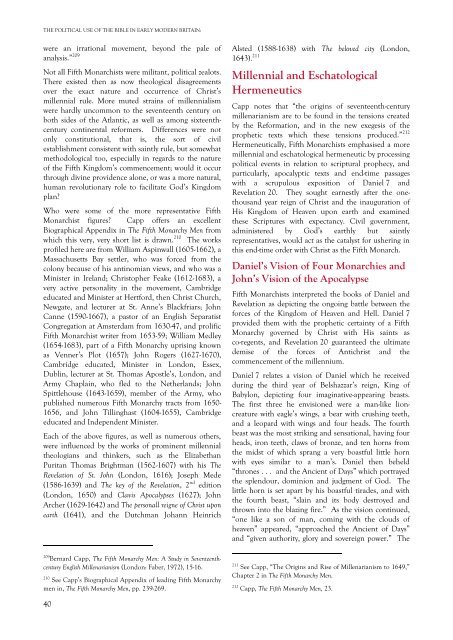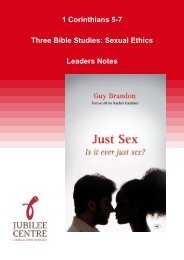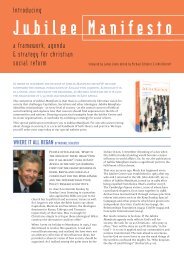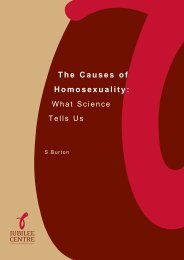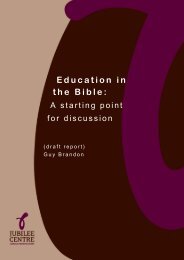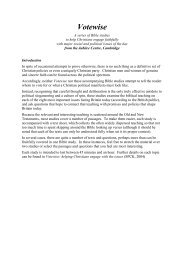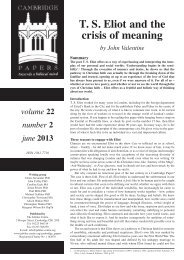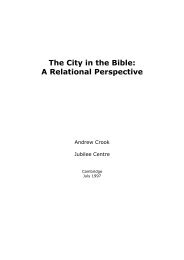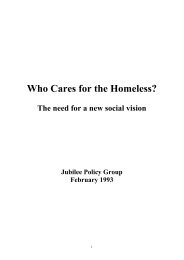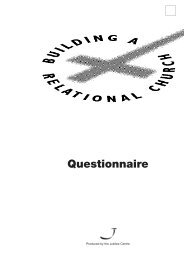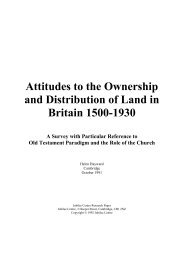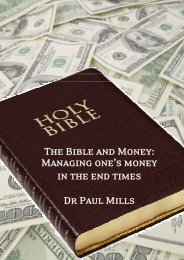Report Template - Jubilee Centre
Report Template - Jubilee Centre
Report Template - Jubilee Centre
Create successful ePaper yourself
Turn your PDF publications into a flip-book with our unique Google optimized e-Paper software.
THE POLITICAL USE OF THE BIBLE IN EARLY MODERN BRITAIN:<br />
were an irrational movement, beyond the pale of<br />
analysis.” 209<br />
Not all Fifth Monarchists were militant, political zealots.<br />
There existed then as now theological disagreements<br />
over the exact nature and occurrence of Christ’s<br />
millennial rule. More muted strains of millennialism<br />
were hardly uncommon to the seventeenth century on<br />
both sides of the Atlantic, as well as among sixteenthcentury<br />
continental reformers. Differences were not<br />
only constitutional, that is, the sort of civil<br />
establishment consistent with saintly rule, but somewhat<br />
methodological too, especially in regards to the nature<br />
of the Fifth Kingdom’s commencement; would it occur<br />
through divine providence alone, or was a more natural,<br />
human revolutionary role to facilitate God’s Kingdom<br />
plan?<br />
Who were some of the more representative Fifth<br />
Monarchist figures? Capp offers an excellent<br />
Biographical Appendix in The Fifth Monarchy Men from<br />
which this very, very short list is drawn. 210 The works<br />
profiled here are from William Aspinwall (1605-1662), a<br />
Massachusetts Bay settler, who was forced from the<br />
colony because of his antinomian views, and who was a<br />
Minister in Ireland; Christopher Feake (1612-1683), a<br />
very active personality in the movement, Cambridge<br />
educated and Minister at Hertford, then Christ Church,<br />
Newgate, and lecturer at St. Anne’s Blackfriars; John<br />
Canne (1590-1667), a pastor of an English Separatist<br />
Congregation at Amsterdam from 1630-47, and prolific<br />
Fifth Monarchist writer from 1653-59; William Medley<br />
(1654-1683), part of a Fifth Monarchy uprising known<br />
as Venner’s Plot (1657); John Rogers (1627-1670),<br />
Cambridge educated, Minister in London, Essex,<br />
Dublin, lecturer at St. Thomas Apostle’s, London, and<br />
Army Chaplain, who fled to the Netherlands; John<br />
Spittlehouse (1643-1659), member of the Army, who<br />
published numerous Fifth Monarchy tracts from 1650-<br />
1656, and John Tillinghast (1604-1655), Cambridge<br />
educated and Independent Minister.<br />
Each of the above figures, as well as numerous others,<br />
were influenced by the works of prominent millennial<br />
theologians and thinkers, such as the Elizabethan<br />
Puritan Thomas Brightman (1562-1607) with his The<br />
Revelation of St. John (London, 1616); Joseph Mede<br />
(1586-1639) and The key of the Revelation, 2 nd edition<br />
(London, 1650) and Clavis Apocalypses (1627); John<br />
Archer (1629-1642) and The personall reigne of Christ upon<br />
earth (1641), and the Dutchman Johann Heinrich<br />
209 Bernard Capp, The Fifth Monarchy Men: A Study in Seventeenthcentury<br />
English Millenarianism (London: Faber, 1972), 15-16.<br />
210<br />
See Capp’s Biographical Appendix of leading Fifth Monarchy<br />
men in, The Fifth Monarchy Men, pp. 239-269.<br />
Alsted (1588-1638) with The beloved city (London,<br />
1643). 211<br />
Millennial and Eschatological<br />
Hermeneutics<br />
Capp notes that “the origins of seventeenth-century<br />
millenarianism are to be found in the tensions created<br />
by the Reformation, and in the new exegesis of the<br />
prophetic texts which these tensions produced.” 212<br />
Hermeneutically, Fifth Monarchists emphasised a more<br />
millennial and eschatological hermeneutic by processing<br />
political events in relation to scriptural prophecy, and<br />
particularly, apocalyptic texts and end-time passages<br />
with a scrupulous exposition of Daniel 7 and<br />
Revelation 20. They sought earnestly after the onethousand<br />
year reign of Christ and the inauguration of<br />
His Kingdom of Heaven upon earth and examined<br />
these Scriptures with expectancy. Civil government,<br />
administered by God’s earthly but saintly<br />
representatives, would act as the catalyst for ushering in<br />
this end-time order with Christ as the Fifth Monarch.<br />
Daniel’s Vision of Four Monarchies and<br />
John’s Vision of the Apocalypse<br />
Fifth Monarchists interpreted the books of Daniel and<br />
Revelation as depicting the ongoing battle between the<br />
forces of the Kingdom of Heaven and Hell. Daniel 7<br />
provided them with the prophetic certainty of a Fifth<br />
Monarchy governed by Christ with His saints as<br />
co-regents, and Revelation 20 guaranteed the ultimate<br />
demise of the forces of Antichrist and the<br />
commencement of the millennium.<br />
Daniel 7 relates a vision of Daniel which he received<br />
during the third year of Belshazzar’s reign, King of<br />
Babylon, depicting four imaginative-appearing beasts.<br />
The first three he envisioned were a man-like lioncreature<br />
with eagle’s wings, a bear with crushing teeth,<br />
and a leopard with wings and four heads. The fourth<br />
beast was the most striking and sensational, having four<br />
heads, iron teeth, claws of bronze, and ten horns from<br />
the midst of which sprang a very boastful little horn<br />
with eyes similar to a man’s. Daniel then beheld<br />
“thrones . . . and the Ancient of Days” which portrayed<br />
the splendour, dominion and judgment of God. The<br />
little horn is set apart by his boastful tirades, and with<br />
the fourth beast, “slain and its body destroyed and<br />
thrown into the blazing fire.” As the vision continued,<br />
“one like a son of man, coming with the clouds of<br />
heaven” appeared, “approached the Ancient of Days”<br />
and “given authority, glory and sovereign power.” The<br />
211<br />
See Capp, “The Origins and Rise of Millenarianism to 1649,”<br />
Chapter 2 in The Fifth Monarchy Men.<br />
212<br />
Capp, The Fifth Monarchy Men, 23.<br />
40


